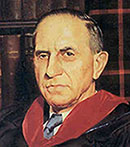In part two of this review of “Jesus the Son of God” we take up the question of Divine Sonship. How are we to understand that which we cannot see? We know that human fatherhood and sonship is a reflection of the Divine relationship which the Bible reveals as the Father and the Son, and the Spirit of the Father and the Spirit of the Son.
Murray says,
“The title ‘Son’ is far too liable to convey to our minds the thought of derivation, and with that the ideas of his being secondary and subordinate in his intrinsic being and station. This liability arises because our thinking is not framed by the biblical concept of Jesus’ Sonship but by transference to his Sonship of notions belonging to sonship as it obtains among men” (77, 78).
Here is a needed warning!
Here is the crux of the problem which is at the root of all talk of eternal derivation, eternal subordination, and eternal begetting. All of these concepts grow out of the transference of certain features of human sonship to the Divine Sonship. So in this statement Murray is issuing a call that we cease from transferring notions of human sonship as it obtains among men, to Jesus’ Sonship. This call is warranted and should be heeded. But what does Murray say about how we should conceive of Jesus’ Sonship?
First, he points out the importance of John 5:17-31 where the claim of Christ to be the Son of God was interpreted by the Jews as a claim to equality with God. “This incident shows that in Jewish conception to claim to be the Son of God was tantamount to a claim to be equal with God (cf. John 19:7).” He adds to this Scripture John 10:33. “For a good work we do not stone you, but for blasphemy, and that you being a man make yourself out to be God.”
Then he builds on these, and other passages like them, to speak about what a Biblical conception of Jesus’ Sonship entails. They are what he calls “the index to his transcendent deity” (79). Here is the key conception and the one which I believe is best to use to speak of Divine Sonship. It is transcendent Sonship. Transcendent means beyond experience; beyond categories. The idea behind the prefix -trans is that it passes through and extends beyond. Jesus’ Sonship is transcendent Sonship, that is, it a Sonship of which ours is merely a dim reflection. Therefore we must be very careful not to transfer elements of human sonship onto the Divine Sonship.
In this article Murray uses language that emphasizes the transcendent Sonship of Jesus. He avoids language that tends to confuse Divine Sonship with human sonship. For example, on pg. 70 he speaks of “intra-divine and eternal Sonship.” This language highlights the mutual indwelling of Father and Son. It also establishes our creedal foundation of belief in the deity of Christ: it is an eternal Sonship.
We know nothing of an eternal Sonship in our experience! And to us sonship implies derivation, inferiority, and limitation. But the Divine Sonship of Jesus admits of no notion of derivation or generation, or inferiority or limitation. Divine Sonship does not allow such notions, no matter how much we qualify them.
On pg. 71 he speaks of “transcendent filiation.” I think this is a helpful expression, and safeguards His Sonship from human notions. It seems to me to be a safe, biblical expression. Filiation speaks of the Sonship relationship. But transcendent identifies this Sonship as passing our thought or experience. In speaking of the witness of the Father to the Son at His baptism Murray writes: “The co-ordination of Father, Son, and Holy Spirit as conjointly participants of the one name and as conjointly the source of covenant blessing and the object of covenantal devotion requires that equivalence of divine dignity be accorded to each person. And so that places him on an equality with the Father and the Holy Spirit. Only intra-divine Sonship possesses this quality” (71).
What about the concept of an eternal (no beginning and no end) begetting (origin) of the Son? Murray seems hesitant to speak in such terms. He states: “No characterization bears out the fact of uniqueness more than the title ‘Only-begotten.’ Only in John’s Gospel and First Epistle is this name used with reference to Christ (John 1:14, 18, 3:16, 18; 1 John 4:9). Whatever significance belongs to the latter part of the compound, it is impossible to overlook what is implicit in the first, namely, that to him alone belong the character and relation denoted” (67).
So what do we mean when we confess that Jesus is the Son of God? We mean:
1. Jesus is God
2. Jesus is the intra-Divine Son of God
3. Jesus is eternally the Son of God (His Sonship was not conferred upon Him at His baptism.)
4. Co-equality inheres in His Sonship.
5. Jesus is one in essence with the Father, yet a distinct Person from the Father.
6. Jesus is not eternally derived from the Father, nor is He eternally born of the Father.
What a great Savior/Son is ours! The eternal Son of God has come into the world as the human son of Mary so that we might be granted the status of sonship with Him. But His is a transcendent Sonship. I hope that you will dig into John Murray’s article to enrich your understanding of Jesus’ Sonship.
We are on holy ground when thinking of Jesus as the Son of God. We must take off our shoes. We must shed inappropriate theological terminology. We must admit our limitations. And as we do this, our faith will be established. And when our faith is strengthened in this way, our witness and proclamation of Jesus as the Son of God will be empowered.
In our next article we will explore what features of human sonship are like the Divine.
Pastor John Reuther

